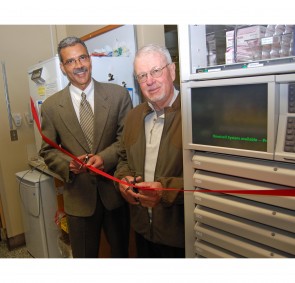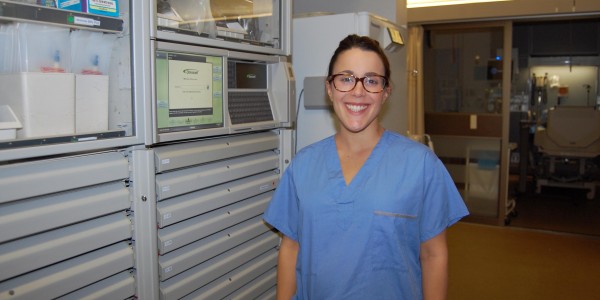From apprehensive to ‘spoiled’ – ICU RN grateful and thankful for Omnicell cabinets
Apprehension. That’s what Melissa Graf, an RN in the ICU at Lions Gate Hospital, felt when she first heard about the introduction of Omnicell Automated Dispensing Cabinets (ADCs) into her nursing life a few years ago.
“Honestly, I saw Omnicell as something that was just going to increase my workload as a nurse and that of my peers, as we would all be lining up in the morning or throughout the day waiting to access the same machine as everyone else,” says Melissa.
How times change
Fast forward to the present day and you won’t hear any complaints from Melissa. In fact, she considers herself “spoiled” to have the ADCs on the ICU.
“The time savings for RNs are huge,” says Melissa. “Rather than dealing with prehistoric cabinets or carts of meds that may require the nurse to go to many different locations for their drugs or make constant calls to pharmacy, or send messages through the computer systems when medications are not available or missing, it’s nice to have a majority of medications in one spot. Also, in an environment where many dosages of narcotics are given, it’s nice to have something that ensures that proper dosages are given at scheduled intervals.”
Laying the groundwork
Earlier this week, LGH celebrated implementation of the Omnicell Project, a foundational initiative for VCH’s Clinical and Systems Transformation Project (CST) and a key component of Closed Loop Medication Management (CLMM).
Three new cabinets went live on the 4E and 4W on Tuesday April 12th and are part of a wave of 27 new cabinets that will be installed in the acute and ambulatory patient care areas over the next 10-12 weeks at the hospital.

(l-R) Mark Collins, CST LGH Pharmacy Project Lead, and Bob Morrison, LGH Auxiliary Co-President, joined forces in the ceremonial ribbon cutting that marked the implementation of the Omnicell Project at LGH. The Auxiliary generously donated funds to purchase two Omnicell cabinets.
A generous donation from the LGH Auxiliary made it possible to purchase two of the three 4th floor cabinets. Bob Morrison, Auxiliary Co-President, joined in the festivities and cut the ceremonial ribbon alongside Mark Collins, CST LGH Pharmacy Project Lead, to mark the beginning of the implementation of the CLMM System at the hospital.
CLMM is the process where all steps of the medication cycle are managed electronically – from computerized order entry, through verification, preparation by pharmacy, storage on the units to the administration of a bar-coded medication at the patient’s bedside.
ADCs first introduced at LGH in 2008
Thanks to funding from the LGH Foundation, ADCs were first installed at the hospital on five units (the operating room, PAR, emergency department, ICU and the palliative unit) in 2008. The HOpe Centre inpatient unit received one in December 2014. Earlier this year, all six existing ADCs were upgraded.
Once all units are in place at LGH by the end of June, it will be followed by a roll-out throughout the Coastal Community of Care starting with Squamish General Hospital. Stay tuned for more details.
For Melissa, she’s just glad the ICU has had an ADC since she started working on the unit three and a half years ago.
“I can remember my life without Omincell, but that’s what makes me so happy we have it,” says Melissa who noted that the Omnicell training was one of the easiest learning experiences of her ICU training. “We’re now spoiled.”

